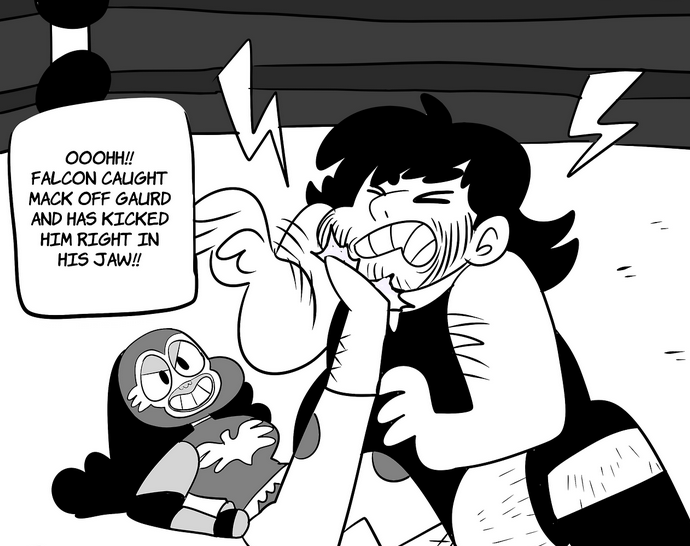You'd imagine that professional wrestling would be a natural fit for comics. The characters and storylines are larger than life. Undead cowboys! Evil clowns! Heroes carrying two-by-fours against a red, white and blue backdrop! Masked, underdog heroes who can fly around the ring like they have the proportional agility of a spider! Both even went through similar phases in the '90s, with superstars taking on grim-and-gritty personae while indies made a mark with strange, unconventional ideas. So how come wrestling comics aren't quite so prominent?
The big stumbling block is that --- SPOILER ALERT FOR ANYONE UNDER 7! --- everyone's aware that wrestling is fake. Stories struggle with a dual identity: the one that are manufactured by the promoter (called "kayfabe") and the sometimes even more compelling stories that exist outside the ring. The WWE generally uses influences from both, acknowledging that, say, Stephanie McMahon and wrestler Triple H are indeed married, but makes them more cartoony than they are in real life. A prestige film like The Wrestler is more concerned with the real-world implications and the toll that sports entertainment takes on a wrestler's body.
Wrestling comics, though? It's almost always kayfabe. It's never acknowledged that matches are predetermined, and the animosity between rivals is real, not a scripted plot contrivance. Alan Evans' Rival Angels, for example, feels more like the saga of female MMA fighters, with the only difference being the splashier movesets and finishers.
Meghan Danger's Tagged! takes the genre into a slightly different fantasy scenario. The Over the Top Wrestling promotion is incredibly diverse: People from different racial backgrounds are hired at all levels, and the company's promoter is a tough African-American woman. In addition, Over the Top Wrestling treats men and women as equals, and a small lady dressed up as Rey Mysterio Jr. can battle a guy who looks as big as Luke Harper.
Unlikely? Well, just remember: in the real world, unathletic actor David Arquette was infamously once the WCW World Heavyweight Champion. Pandora's Box opened.
Our story centers on Big Mack, a gentle giant with dreams of being a good-guy wrestler (aka a "face") but just doesn't have to fan support to pull it off. (Or as I like to call it, "the John Cena story.") The promotion's resident bad guys (aka "heels") advise him that if he wants to ever be in title contention, he's got to turn on the fans. Incidentally, Big Mack isn't the only male wrestler in an all-female promotion, as it looks initially. Apparently, there's a shirtless CM Punk-looking guy who's not, you know, lounging around that way because it's too hot.
Well, Big Mack decides to give into the dark side and he decides to heel it up for the audience. It's an interesting way around the kayfabe: Faces and heels aren't a natural disposition, but, like real life, a choice that each performer has to make to curry audience approval. It seems to work pretty well, as audience response to his match against Falcon gets pretty heated.
Over the Top Wrestling seems to be one of those crappy fly-by-night promotions, however, because right in the middle of the match a skylight falls from the ceiling. Big Mack has no choice but to save Falcon ... and the crowd immediately hails him as a hero. The match is ruled "no contest," and Falcon's dreams of becoming a title contender are dashed. However, where one door closes, another opens: their promoter puts the two of them in a tag team.
Tagged! is a pretty goofy comic with zero realism. I mean, Big Mack doesn't even recognize his rival/tag-team partner without her mask. But it is a silly, fun all-ages webcomic that young female wrestling fans can especially enjoy. Unlike the realities of this world (where female wrestlers are almost always treated as eye candy), Tagged! is where the girls can put up as much fight as the boys, wrestling is real, and a guy doesn't have to be a heel just because he looks mean.

